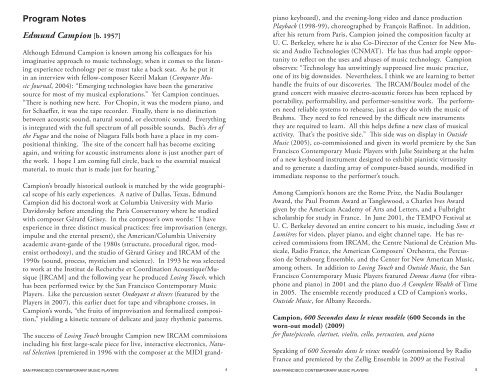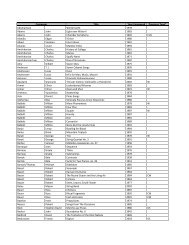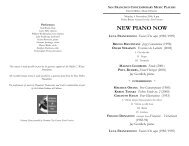From the Top - San Francisco Contemporary Music Players
From the Top - San Francisco Contemporary Music Players
From the Top - San Francisco Contemporary Music Players
You also want an ePaper? Increase the reach of your titles
YUMPU automatically turns print PDFs into web optimized ePapers that Google loves.
Program Notes<br />
Edmund Campion [b. 1957]<br />
Although Edmund Campion is known among his colleagues for his<br />
imaginative approach to music technology, when it comes to <strong>the</strong> listening<br />
experience technology per se must take a back seat. As he put it<br />
in an interview with fellow-composer Keeril Makan (Computer <strong>Music</strong><br />
Journal, 2004): “Emerging technologies have been <strong>the</strong> generative<br />
source for most of my musical explorations.” Yet Campion continues,<br />
“Th ere is nothing new here. For Chopin, it was <strong>the</strong> modern piano, and<br />
for Schaeff er, it was <strong>the</strong> tape recorder. Finally, <strong>the</strong>re is no distinction<br />
between acoustic sound, natural sound, or electronic sound. Everything<br />
is integrated with <strong>the</strong> full spectrum of all possible sounds. Bach’s Art of<br />
<strong>the</strong> Fugue and <strong>the</strong> noise of Niagara Falls both have a place in my compositional<br />
thinking. Th e site of <strong>the</strong> concert hall has become exciting<br />
again, and writing for acoustic instruments alone is just ano<strong>the</strong>r part of<br />
<strong>the</strong> work. I hope I am coming full circle, back to <strong>the</strong> essential musical<br />
material, to music that is made just for hearing.”<br />
Campion’s broadly historical outlook is matched by <strong>the</strong> wide geographical<br />
scope of his early experiences. A native of Dallas, Texas, Edmund<br />
Campion did his doctoral work at Columbia University with Mario<br />
Davidovsky before attending <strong>the</strong> Paris Conservatory where he studied<br />
with composer Gérard Grisey. In <strong>the</strong> composer’s own words: “I have<br />
experience in three distinct musical practices: free improvisation (energy,<br />
impulse and <strong>the</strong> eternal present), <strong>the</strong> American/Columbia University<br />
academic avant-garde of <strong>the</strong> 1980s (structure, procedural rigor, modernist<br />
orthodoxy), and <strong>the</strong> studio of Gèrard Grisey and IRCAM of <strong>the</strong><br />
1990s (sound, process, mysticism and science). In 1993 he was selected<br />
to work at <strong>the</strong> Institut de Recherche et Coordination Acoustique/Musique<br />
[IRCAM] and <strong>the</strong> following year he produced Losing Touch, which<br />
has been performed twice by <strong>the</strong> <strong>San</strong> <strong>Francisco</strong> <strong>Contemporary</strong> <strong>Music</strong><br />
<strong>Players</strong>. Like <strong>the</strong> percussion sextet Ondoyant et divers (featured by <strong>the</strong><br />
<strong>Players</strong> in 2007), this earlier duet for tape and vibraphone crosses, in<br />
Campion’s words, “<strong>the</strong> fruits of improvisation and formalized composition,”<br />
yielding a kinetic texture of delicate and jazzy rhythmic patterns.<br />
Th e success of Losing Touch brought Campion new IRCAM commissions<br />
including his fi rst large-scale piece for live, interactive electronics, Natural<br />
Selection (premiered in 1996 with <strong>the</strong> composer at <strong>the</strong> MIDI grand-<br />
SAN FRANCISCO CONTEMPORARY MUSIC PLAYERS<br />
4<br />
piano keyboard), and <strong>the</strong> evening-long video and dance production<br />
Playback (1998-99), choreographed by François Raffi not. In addition,<br />
after his return from Paris, Campion joined <strong>the</strong> composition faculty at<br />
U. C. Berkeley, where he is also Co-Director of <strong>the</strong> Center for New <strong>Music</strong><br />
and Audio Technologies (CNMAT). He has thus had ample opportunity<br />
to refl ect on <strong>the</strong> uses and abuses of music technology. Campion<br />
observes: “Technology has unwittingly suppressed live music practice,<br />
one of its big downsides. Never<strong>the</strong>less, I think we are learning to better<br />
handle <strong>the</strong> fruits of our discoveries. Th e IRCAM/Boulez model of <strong>the</strong><br />
grand concert with massive electro-acoustic forces has been replaced by<br />
portability, performability, and performer-sensitive work. Th e performers<br />
need reliable systems to rehearse, just as <strong>the</strong>y do with <strong>the</strong> music of<br />
Brahms. Th ey need to feel renewed by <strong>the</strong> diffi cult new instruments<br />
<strong>the</strong>y are required to learn. All this helps defi ne a new class of musical<br />
activity. Th at’s <strong>the</strong> positive side.” Th is side was on display in Outside<br />
<strong>Music</strong> (2005), co-commissioned and given its world premiere by <strong>the</strong> <strong>San</strong><br />
<strong>Francisco</strong> <strong>Contemporary</strong> <strong>Music</strong> <strong>Players</strong> with Julie Steinberg at <strong>the</strong> helm<br />
of a new keyboard instrument designed to exhibit pianistic virtuosity<br />
and to generate a dazzling array of computer-based sounds, modifi ed in<br />
immediate response to <strong>the</strong> performer’s touch.<br />
Among Campion’s honors are <strong>the</strong> Rome Prize, <strong>the</strong> Nadia Boulanger<br />
Award, <strong>the</strong> Paul <strong>From</strong>m Award at Tanglewood, a Charles Ives Award<br />
given by <strong>the</strong> American Academy of Arts and Letters, and a Fulbright<br />
scholarship for study in France. In June 2001, <strong>the</strong> TEMPO Festival at<br />
U. C. Berkeley devoted an entire concert to his music, including Sons et<br />
Lumières for video, player piano, and eight channel tape. He has received<br />
commissions from IRCAM, <strong>the</strong> Centre National de Création <strong>Music</strong>ale,<br />
Radio France, <strong>the</strong> American Composers’ Orchestra, <strong>the</strong> Percussion<br />
de Strasbourg Ensemble, and <strong>the</strong> Center for New American <strong>Music</strong>,<br />
among o<strong>the</strong>rs. In addition to Losing Touch and Outside <strong>Music</strong>, <strong>the</strong> <strong>San</strong><br />
<strong>Francisco</strong> <strong>Contemporary</strong> <strong>Music</strong> <strong>Players</strong> featured Domus Aurea (for vibraphone<br />
and piano) in 2001 and <strong>the</strong> piano duo A Complete Wealth of Time<br />
in 2005. Th e ensemble recently produced a CD of Campion’s works,<br />
Outside <strong>Music</strong>, for Albany Records.<br />
Campion, 600 Secondes dans le vieux modèle (600 Seconds in <strong>the</strong><br />
worn-out model) (2009)<br />
for fl ute/piccolo, clarinet, violin, cello, percussion, and piano<br />
Speaking of 600 Secondes dans le vieux modèle (commissioned by Radio<br />
France and premiered by <strong>the</strong> Zellig Ensemble in 2009 at <strong>the</strong> Festival<br />
SAN FRANCISCO CONTEMPORARY MUSIC PLAYERS<br />
5




